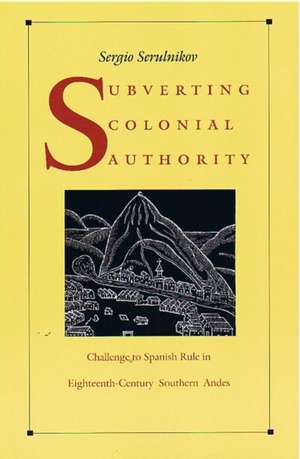Subverting Colonial Authority – Challenges to Spanish Rule in Eighteenth–Century Southern Andes
Autor Sergio Serulnikoven Limba Engleză Paperback – 22 sep 2003
Preț: 243.11 lei
Nou
Puncte Express: 365
Preț estimativ în valută:
46.52€ • 48.57$ • 38.41£
46.52€ • 48.57$ • 38.41£
Carte indisponibilă temporar
Doresc să fiu notificat când acest titlu va fi disponibil:
Se trimite...
Preluare comenzi: 021 569.72.76
Specificații
ISBN-13: 9780822331469
ISBN-10: 0822331462
Pagini: 304
Ilustrații: 9 tables, 3 maps
Dimensiuni: 153 x 233 x 18 mm
Greutate: 0.4 kg
Editura: MD – Duke University Press
ISBN-10: 0822331462
Pagini: 304
Ilustrații: 9 tables, 3 maps
Dimensiuni: 153 x 233 x 18 mm
Greutate: 0.4 kg
Editura: MD – Duke University Press
Recenzii
"I enjoyed reading Subverting Colonial Authority, and feel it significantly contributes to the literature on colonial Latin America and the Andean region."Robert Jackson, History: A Review of Books"[A] very interesting and fine book. Serulnikov has made an important contribution to our understanding of peasant politics and consciousness, colonial authority and legitimacy, and the evolving understandings peasants and rulers had of each other.Ward Stavig, American Historical Review"In this important work, Serulnikov concentrates on explaining manifestations of subaltern politics and culture. His well-researched findings from Bolivian and Argentine archives raise important questions about the actions of those at various levels in the Spanish colonial administration and make clear obvious faultlines for future research."Maurice P. Brungardt, Colonial Latin American Historical Review"This book finally gives us important insights into one of the major colonial Andean rebellions and has implications for understanding the effects of the Bourbon reforms in late colonial Spanish America. . . . [S]pecialists will find this book a very useful, indeed essential, addition to the literature."Erick D. Langer, Journal of Social History"[O]utstanding. . . . [A] fascinating account of popular political mobilization that successfully combines detailed archival research with the rich historiography of the late colonial Andes. . . . [A] path-breaking study. . . ."Matthew D. O'Hara, Itinerario"[I]ntelligent, well argued and convincingly set out. . . . [T]his is a most welcome contribution to the study of the Andean rebellions, filling a gap in reading lists for courses analysing the transition from colonial rule in Hispanic America."Matthew Brown, Bulletin of Latin American ResearchThis book falls into a long line of good, sometimes pathbreaking, literature about the empowerment and agency of Indians in the Spanish colonial empire of America. . . . Serulnikov's study deepens and enriches our understanding of the remarkable synthesis that occurred when Spaniards and Indians came together to make a new society. Lawrence A. Clayton, Journal of Interdisciplinary History
Notă biografică
Textul de pe ultima copertă
"Sergio Serulnikov analyzes the root causes, key moments, and bloody consequences of the massive indigenous revolt that nearly toppled Spanish rule in the southern Andes in the early 1780s. Exhaustively researched and cogently argued, this is a major work on the connection between everyday resistance to colonialism and revolutionary upheaval to end it forever. Essential reading for students and scholars of colonial rule everywhere."--John H. Coatsworth, Harvard University
Cuprins
Acknowledgments vii
Introduction 1
1. Political Legitimacy in Mid-Eighteenth-Century Andean Villages 19
2. From a Multiethnic Community to a Multiethnic Chieftanship: Florencia Lupa, Cacique of Moscari 54
3. Customs and Rules: Bourbon Rationalizing Projects and Social Conflicts in the 1770s 85
4. Disputed Images of Colonialism: Spanish Rule and Indian Subversion, 1777–1780 122
5. The Dilemmas of Self-Rule 157
6. In the Land of Heretics 186
Conclusion: Andean Political Imagination in Times of Insurgency 215
Notes 229
References 267
Index 277
Introduction 1
1. Political Legitimacy in Mid-Eighteenth-Century Andean Villages 19
2. From a Multiethnic Community to a Multiethnic Chieftanship: Florencia Lupa, Cacique of Moscari 54
3. Customs and Rules: Bourbon Rationalizing Projects and Social Conflicts in the 1770s 85
4. Disputed Images of Colonialism: Spanish Rule and Indian Subversion, 1777–1780 122
5. The Dilemmas of Self-Rule 157
6. In the Land of Heretics 186
Conclusion: Andean Political Imagination in Times of Insurgency 215
Notes 229
References 267
Index 277
Descriere
A political history, giving the first systematic examination of how and why localized forms of indigenous community protest against Spanish rule in the Andean region produced a new ethnic consciousness and violent uprisings.
